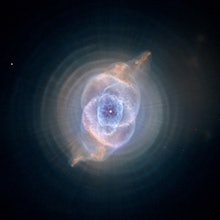A New Equation Counts How Many Alien Civilizations Have Ever Existed

When we look at the stillness of the night sky — stars and galaxies, combusted leviathans that died out long ago — it's easy to feel like we're alone in the universe. But a new paper gives us reason to believe in intelligent life, and probably a shit ton of it.
Even if the chances of intelligent life forming are only 1 in 10 billion, that still means we've shared the universe with a trillion alien civilizations.
The article, published in the journal Astrobiology, tries to estimate how many civilizations have existed in the history of the universe. "We call it extraterrestrial archaeology," paper co-author Adam Frank, a professor of physics and astronomy at the University of Rochester, said in a phone interview.
What life came before us?
You might have heard of the Fermi paradox, which explains why alien life hasn't found us yet, or the Drake equation, which was developed in 1961 to identify how many alien civilizations might exist right now. This new equation is different. Its goal is to find the number of technological civilizations that have formed since the Big Bang.
It works by multiplying the number of habitable planets in the universe — planets with temperatures that could support life — and the likelihood of that species rising on one of the planets.
Humanity has been around with crude technology for about 10,000 years, but that doesn't mean an alien civilization would have ever overlapped with us. While the Drake equation factors in the potential lifespan of other intelligent civilizations, Frank and his collaborator, Woodruff Sullivan, consider that impossible to determine. The new approach looks at if, not when, a civilization has existed.
"Somewhere out there, nature, through evolution and its processes, has determined what the probability of a given planet is going to be for the intelligent life to form," Frank said. "We don't know what that is, but nature knows. And we figured out how low that probability would have to be" for us to be the only intelligent life in the history of the universe.
According to Frank's equation, given how many planets exist and how many years the universe has existed, there's a 1 in 10 billion trillion chance that humans are the only civilization to ever live.
"If you asked a pessimist 20 years ago how bad they thought the odds were, they'd say a 1 in 10 billion chance that there's intelligent life on another planet," Frank said. "According to our results, that leaves a trillion times a species has gone through evolution, become self-conscious and started to build technology. A trillion civilizations."
Humanity's final exam: Climate change
In the timeline of the universe, humanity as a technological society has existed for an infinitesimal period — about 0.0000007% of the universe's estimated 14 billion years. That pan-flash of a lifespan could be a trait we share with alien civilizations. And a sign of bad news to come.
"I think climate change is a natural consequence of having intelligence," Frank said. "Any species that builds an energy-intensive civilization pushes back on its planet, and the planet starts to change. You either figure out how to make it through that — or you die."
Climate change may turn out to be the "Great Barrier" referenced in the Fermi paradox, an unknown variable that kills civilizations on their way to advancement. It's possible: If we don't stop burning fossil fuels, our planet could become uninhabitable.
But overcoming climate change will require a shift in how an entire race thinks. It takes global cooperation, which is not our strong suit on Earth. We have to consider the 22nd-century ramifications of things we do today. To make it through, evolutionarily, we'll have to change our behavior.
What happens after we conquer climate change?
If we, as a global community, manage to control global warming and sustain the planet, humanity could reach a giant leap forward, Frank said. That'd mean expansion throughout the galaxy, a larger civilization and technological advancements we haven't even dreamed of yet.
Like what? "If I can get all science-fiction on you," Frank said, "the next step may be interactions with other civilizations."
With governments and private space agencies looking at asteroid-mining and planetary colonization, we're on the cusp of transitioning space exploration into a cosmic business venture that could launch us farther into the universe. Getting there is going to take everyone's help: Humanity will need to adopt the common sense to stop beating the shit out of the atmosphere, and we'll need to prioritize the innovations necessary to explore the universe.
Humanity is going to be tested on its ability to adapt to climate change. If we can break through this barrier intact, we could become the kind of advanced civilization fledgling societies have in mind when they, like us, look into the night sky, wondering if they're alone in the universe.
"We're aliens," Frank said. "We're an expression of the planet. We're an experiment the planet is running. This paper shows us it's highly probable this experiment has been run many, many times before."